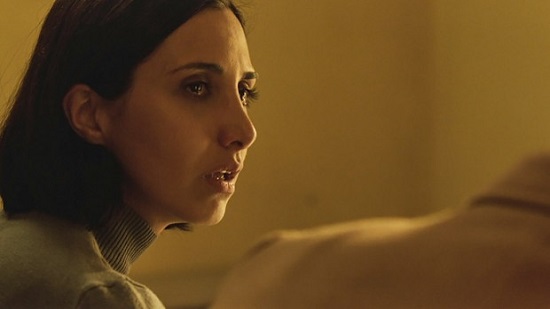With so many horror films trading ideas for scares, its refreshing to find one that has an abundance of both. Placing a mother and child into the same psycho-supernatural danger as films like Rosemary’s Baby, Poltergeist or more recently The Babadook, Babak Anvari’s Under The Shadow continues a rich tradition of horror films in which the unresolved traumas of a conflicted mother and child manifest themselves as malevolent entities.
Set in 1988, during the height of the Iran-Iraq War, Under The Shadow doesn’t immediately announce itself as a horror. Although the threat of aerial bombardment is evident in the tape on the windows to prevent flying glass from bomb blasts, or the occasional rattle of gunfire, you’d assume the war was a distant concern for Shideh (Narges Rashidi) who continues to live in her apartment in the centre of Tehran with her husband Iraj (Bobby Naderi) and their young daughter, Dorsa (Avin Manshadi). Shideh has more pressing concerns than the war after recently discovering she’s been blacklisted from her university due to accusations of political subversion by the post-Revolution government. The film’s nuanced introduction, outlining Shideh’s dissatisfaction with her new life as a house wife and her simmering resentment towards her husband is filmed in a modest, observational style resembling something closer to a conventional domestic drama than a terrifying ghost story.
This understated approach has led to comparisons with the work of Iranian director Asghar Farhadi, renowned for his taut morality tales such as About Elly and A Seperation. The sympathetic manner in which Anvari balances empathy and paranoia to articulate Shideh’s suffocation owes much to Farhadi’s measured approach to narrative, but don’t be fooled, it soon becomes apparent Anvari is playing with audience expectations and quietly laying the foundations for a truly terrifying second act. When Iraj is drafted and ordered to join the troops on the frontline he insists Shideh and Dorsa leave the city and seek refuge at his parent’s house in the county, but Shideh refuses, preferring to stay in a warzone, than live under the same roof as her in-laws. Her resolve is soon put to the test when, shortly after Iraj departs, a missile crashes into their upstairs neighbour’s apartment. Although the missile fails to detonate, it quickly becomes apparent it’s ushered a malevolent spirit into the building.
The vindictive spectres that invaded the house are Djinn, evil spirits that travel on the wind. They focus their energies on Dorsa. At first it’s just bad dreams, but after a while she can be overheard in adjoining rooms talking to herself while searching for her missing doll. For those unfamiliar with Djinn, Shideh’s superstitious neighbours are on hand to explain their origins. They’re also more than happy to remind Shideh of her failings as a wife and mother. What transpires from here is a sceptical ghost story, with Anvari leaving open the faint possibility that there really is something supernatural haunting mother and daughter; leaving it to the viewer to decide whether the threat Shideh encounters is a shared experience or a psychosomatic manfiestation of her anxiety over her abilities as a mother. Rashidi gives an extraordinary, emotionally draining performance, playing Shideh like a vehicle veering recklessly into the hard-shoulder, swerving expertly between rebellious wife and concerned mother without succumbing to genre stereotype and becoming the vulnerable female victim.
Shideh’s concerns over her abilities as a mother and the oppressive atmosphere she lives in are perhaps best observed when, after a terrifying encounter with a Djinn, she’s arrested for chasing Dorsa outside the apartment without her chador. She’s spared lashes, but you can sense her anger in the subsequent scene when she returns home, undresses down to a tank top, and works out to her pirated Jane Fonda exercise tape. The gradual decline of her mental wellbeing is articulated expertly by cinematographer Kit Fraser, whose intelligent camerawork gradually evolves from conventional tracking shots to a more erratic style; manipulating aspect ratios and composition to mirror Shideh’s disorientation and loss of sanity.
Gradually building and then sustaining tension throughout, Anvari has crafted a domestic horror that respects and understands genre conventions while firmly establishing its own identity. Based loosely on his own childhood experiences living in Tehran during the Cultural Revolution and the Iran-Iraq War, Under The Shadow occupies the space between the personal and political. Behind every jump-scare and heart-stopping bump in the night, is a fear rooted in years of bloodshed and oppression, with the film built around interactions between the past and present, the living and the dead. An intelligent synthesis of genre formula and social observation, this is a ghost story where the political undertones are far scarier than anything lurking in the shadows.
Under The Shadow is in selected cinemas now



